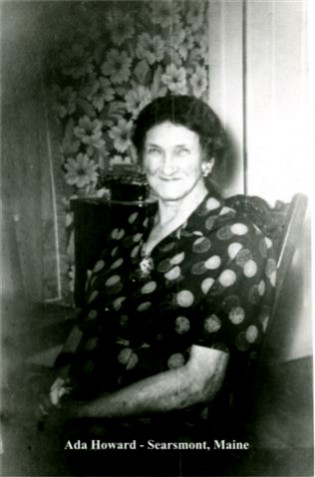
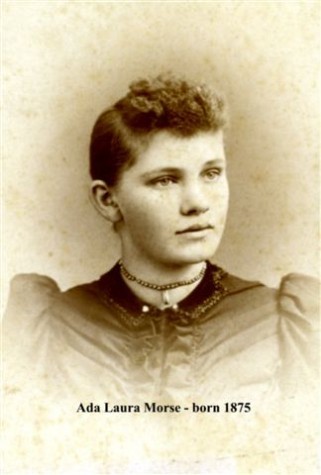 Ada
looked out of the window from her
bed at the Camden Community
Hospital. The street scene was not
at all familiar, nor comparable with
the farm scenes where she had spent
the most of her life.
Ada
looked out of the window from her
bed at the Camden Community
Hospital. The street scene was not
at all familiar, nor comparable with
the farm scenes where she had spent
the most of her life.
Ada’s
life had been filled with the voices
and laughter of children, though
most of the children had not been
her own. She also recalled the
sorrows that life brings. She had
been born in Belmont, Maine on the
twenty-second day of June 1875, one
of the four children of Moses and
Susan (Shea) Morse, as their
youngest child and second daughter.
Ada had never in her life traveled
far from the home where she was
born. She had been named for her
mother’s younger sister, Ada Laura
Shea, who had died shortly after her
marriage in childbirth.
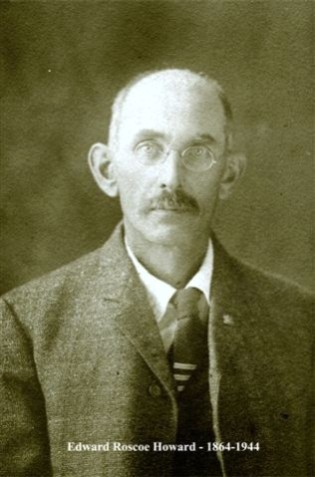 Edward
Howard lived on the farm next-door
to the Morse family with his
parents, Simon and Oraville Howard.
Ed was nearly eleven years older
than Ada. They had known each other
all of their lives, and married on
New Year’s Day of 1895, when Ada was
nineteen years old. A few months
later, Ada’s premature infant son
was born, living only eight days.
Edward
Howard lived on the farm next-door
to the Morse family with his
parents, Simon and Oraville Howard.
Ed was nearly eleven years older
than Ada. They had known each other
all of their lives, and married on
New Year’s Day of 1895, when Ada was
nineteen years old. A few months
later, Ada’s premature infant son
was born, living only eight days.
Ada
and Ed lived with his parents on the
farm. She did her share of the
cooking, laundry, housekeeping,
gardens, canning, barn chores, and
all that was expected of her. Their
social life consisted of the
meetings at Mystic Grange down at
Centre Belmont, and evening card
parties with the neighbors, among
whom were the Wilkins and Dickeys
down the road at the corner. Being a
good Maine cook, Ada’s contributions
to the Grange suppers were always
appreciated.
In
1898, three years after their
marriage, a son, Dudley Parker
Howard was born. Ada did not know it
then, but Dudley’s birth would
destine the remainder of her life.
Dudley was a handsome, rugged child,
crippled from what Dr. Crooker
diagnosed as polio. Dudley was not
to be held down by his illness. He
got around when he was young by
crawling, making his arms and upper
torso very strong and muscled. His
younger cousin, Amon, also had
polio, but Mother, Amon’s
grandmother, determined that he
would walk, having his older
brothers and cousins walk him
around. Amon did eventually walk,
but Dudley was confined to a
wheelchair for the rest of his life.
Dudley also had a speech problem,
being hard to understand, except by
those closest to him.
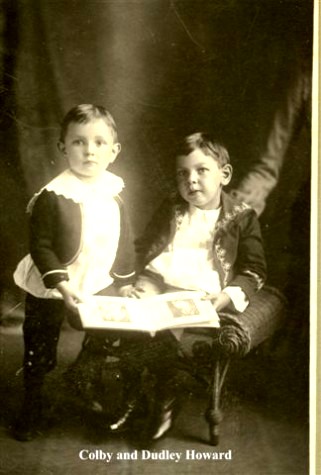 In
1901, Ada gave birth to twin boys,
delivered by Dr. Crooker. One of the
infants was still-born. The
surviving son was named after Ed.
His name was Edward Colby Howard,
always called Colby.
In
1901, Ada gave birth to twin boys,
delivered by Dr. Crooker. One of the
infants was still-born. The
surviving son was named after Ed.
His name was Edward Colby Howard,
always called Colby.
Ed
was a farmer. He served as Selectman
of the Town of Belmont. He kept a
diary for much of his life in which
he recorded the weather, and
happenings of the day, including
births, deaths, funerals, and
calamities such as suicides,
funerals and house fires, among
other things.
In
1888, Ed’s sister, Minnie had
married Charles Simmons. They had a
large family, living over on the
Lincolnville road. Their children
were at the farm almost daily,
playing with the boys and
neighborhood children.
Ada’s
oldest brother, Fred Morse, had gone
to Massachusetts many years before.
He had married Cordelia Hall there,
and had a family of children.
Cordelia died in 1889. Mother took
the Boston boat from Belfast, to
bring Fred’s four children back to
live on the farm next door.
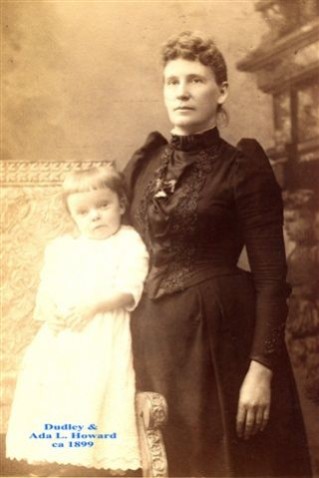 John had married a
month after Ada and Ed to
seventeen-year old Jennie
Levenseller from Lincolnville. John
and Jennie resided next door with
Ada and John’s parents, Moses and
Susan. Jennie was expecting her
eighth child in June of 1907, when
Ada was called with other family
members to come to the farm because
Jennie was not expected to live from
complications of childbirth. Jennie
died shortly after her thirtieth
birthday, leaving another motherless
family at Mother’s. John’s children
were in and out at Ada’s, playing
with Dudley and Colby. It was
convenient for the older children to
sit with Dudley when Ada and Ed had
an occasional day of shopping or
errands at nearby Belmont Corner or
in Belfast.
John had married a
month after Ada and Ed to
seventeen-year old Jennie
Levenseller from Lincolnville. John
and Jennie resided next door with
Ada and John’s parents, Moses and
Susan. Jennie was expecting her
eighth child in June of 1907, when
Ada was called with other family
members to come to the farm because
Jennie was not expected to live from
complications of childbirth. Jennie
died shortly after her thirtieth
birthday, leaving another motherless
family at Mother’s. John’s children
were in and out at Ada’s, playing
with Dudley and Colby. It was
convenient for the older children to
sit with Dudley when Ada and Ed had
an occasional day of shopping or
errands at nearby Belmont Corner or
in Belfast.
Ada
recalled the fire in March, 1913, of
the farmhouse that had belonged to
her parents, next door to Ed’s. John
had remarried a younger wife, May.
They had a young daughter, Faustena.
John and May had gone to Rockland
with a load of barrels made in his
cooper shop. The house burned while
they were gone, leaving the family
homeless. Mother and the girls
stayed with Ada and Ed, while John,
May, Faustena and the boys stayed in
the barn while the house was being
rebuilt.
Ed
recorded in his diary of Jan. 1924,
when Ada’s cousin, a spinster school
teacher, Lucy Cochran died, “Fred,
Etta and Ada went to Belfast. Lucy
Cochren died today. I am keeping
house.” Etta was Ada’s only sister
who married Fred Batchelder, and
lived over the town line in
Searsmont.
Two
months later, Ed recorded in his
diary, “Mrs. Morse died at 7 p.m.”
Ada had gone over to Etta’s to sit
with Mother and was with her when
she died. Ed recorded on Mar. 16:
“Funeral 1 p.m. Snow squally in
afternoon. Cold.” Mother’s body
could not be buried til the weather
cleared.
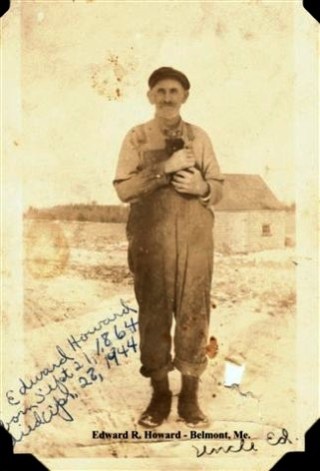 In
1938, Ed recorded on returning home
from Town Meeting, where E. P.
Morrill, T. Whitsome and F. Tower
were elected Selectmen of the Town
of Belmont, “This is the End of my
town work after 28 years of Hell and
Boots in the pants!” In the early
days of World War II, Ed often
recorded, “Saw a plane over today.”
On what became a busy highway in the
Town, Ed would record, “One car by
today.”
In
1938, Ed recorded on returning home
from Town Meeting, where E. P.
Morrill, T. Whitsome and F. Tower
were elected Selectmen of the Town
of Belmont, “This is the End of my
town work after 28 years of Hell and
Boots in the pants!” In the early
days of World War II, Ed often
recorded, “Saw a plane over today.”
On what became a busy highway in the
Town, Ed would record, “One car by
today.”
On
the morning of April 28, 1944, Ed
recorded, “Ground froze hard last
nite. Wind blowing like hell….” Ada
later recorded in his diary, “Ed had
a shock at four o’clock in the
afternoon. Ed died and was buried
May 1.”
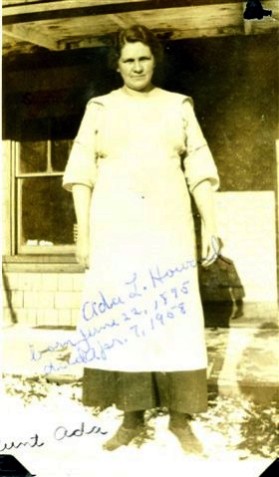 In
1923, Colby had married
seventeen-year old Irva May Miller
of Searsmont. Their first child,
Cedric Colby died in April 1925,
aged seven days. Colby was a
woodsman, hauling many cords of wood
to Oakland, sometimes making two
trips a day. Colby and Irva had four
children, Miller, Donald, Carl and
Lillian. In 1948, Irva tragically
drowned in the Georges River behind
their house in Searsmont Village.
In
1923, Colby had married
seventeen-year old Irva May Miller
of Searsmont. Their first child,
Cedric Colby died in April 1925,
aged seven days. Colby was a
woodsman, hauling many cords of wood
to Oakland, sometimes making two
trips a day. Colby and Irva had four
children, Miller, Donald, Carl and
Lillian. In 1948, Irva tragically
drowned in the Georges River behind
their house in Searsmont Village.
After
Irva’s untimely death, Colby asked
Ada and Dudley to come live with him
to keep house. Ada recorded in Ed’s
diary, “Came to Searsmont Apr. 1,
1948. Went to Clarence’s Feb. 30,
1949. Stayed til April 12, and came
back to Colby’s.” Clarence was her
nephew who lived in Belmont. Colby
had remarried in the Fall of 1948 to
a woman named Mattie, who had made
life almost unbearable for Ada and
Dudley.
When
Ada came to Colby’s, she sold the
farm in Belmont to her nephew, Amon.
Colby died of tuberculosis at the
Sanitarium in Fairfield in 1950,
aged 49 years. After his death, Ada
found that his home was heavily
mortgaged. She did not know where
she and Dudley would go. After some
family meetings, the mortgage to the
house in Searsmont was paid off by
her nephew, giving them security in
knowing that they had a place to
live.
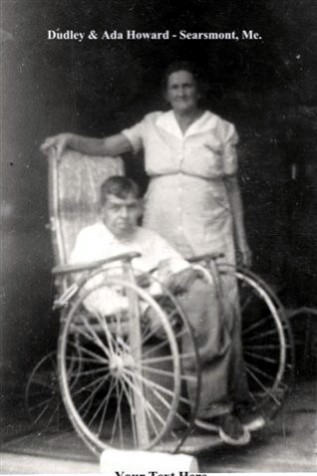 Dudley
was a comfort to Ada, as they had
been together all of his life.
Dudley had a keen mind, though his
body was crippled since childhood,
confined to a wheelchair. Ada lifted
him to and from bed daily. He was a
heavy man. The years of hard work
and lifting had taken a toll on her
body. Dudley died in Nov. of 1954.
Ada recorded his death in Ed’s last
dairy, writing, “Poor boy!”
Dudley
was a comfort to Ada, as they had
been together all of his life.
Dudley had a keen mind, though his
body was crippled since childhood,
confined to a wheelchair. Ada lifted
him to and from bed daily. He was a
heavy man. The years of hard work
and lifting had taken a toll on her
body. Dudley died in Nov. of 1954.
Ada recorded his death in Ed’s last
dairy, writing, “Poor boy!”
Now
Ada was in the hospital, having
surgery. It was discovered that she
had cancer. She could see the shores
of Heaven and the many who had been
a part of her life, a life that had
been devoted to care-giving for her
extended family of children,
grandchildren, nieces, nephews and
neighbors.
Ada
had kept busy, even in her declining
years. She crocheted afghans,
doilies, and made ‘candle-wicking’
bed spreads of bleached white flour
and grain sacks, sewed together to
bed size, with colored ‘wicking’
threads woven to make a beautiful
spread. When guests admired her
hand-made items, they often went
home with them.
A
nephew, Clarence, recalled to his
family that had it not been for Aunt
Ada’s cooking and sewing for the
many, many nieces and nephews over
the years, they would have been in
more dire straits than they were. No
one went away from her house hungry.
Until her death at the Camden
Community Hospital, Ada, known as
Aunt Ada to many, was honored,
revered and loved by all who knew
her. Neighbors recalled seeing her
reading her Bible on the front lawn
under the maple tree in Searsmont
Village.
Ada
had lived eighty-two years of a
caring life. She is buried in the
Marriner Yard in East Searsmont with
Ed, her first-born infant son, and
Dudley, with her parents and many of
those that she dearly loved buried
nearby.
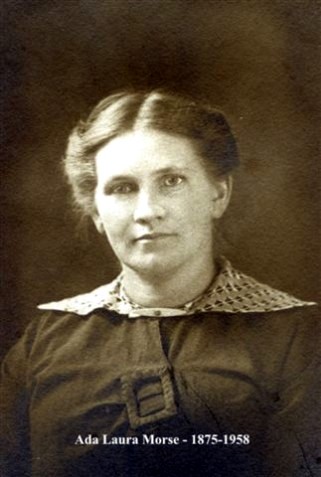
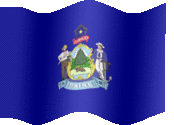
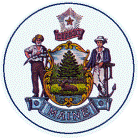
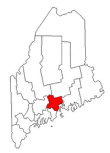

 Ada
looked out of the window from her
bed at the Camden Community
Hospital. The street scene was not
at all familiar, nor comparable with
the farm scenes where she had spent
the most of her life.
Ada
looked out of the window from her
bed at the Camden Community
Hospital. The street scene was not
at all familiar, nor comparable with
the farm scenes where she had spent
the most of her life.  Edward
Howard lived on the farm next-door
to the Morse family with his
parents, Simon and Oraville Howard.
Ed was nearly eleven years older
than Ada. They had known each other
all of their lives, and married on
New Year’s Day of 1895, when Ada was
nineteen years old. A few months
later, Ada’s premature infant son
was born, living only eight days.
Edward
Howard lived on the farm next-door
to the Morse family with his
parents, Simon and Oraville Howard.
Ed was nearly eleven years older
than Ada. They had known each other
all of their lives, and married on
New Year’s Day of 1895, when Ada was
nineteen years old. A few months
later, Ada’s premature infant son
was born, living only eight days. In
1901, Ada gave birth to twin boys,
delivered by Dr. Crooker. One of the
infants was still-born. The
surviving son was named after Ed.
His name was Edward Colby Howard,
always called Colby.
In
1901, Ada gave birth to twin boys,
delivered by Dr. Crooker. One of the
infants was still-born. The
surviving son was named after Ed.
His name was Edward Colby Howard,
always called Colby. John had married a
month after Ada and Ed to
seventeen-year old Jennie
Levenseller from Lincolnville. John
and Jennie resided next door with
Ada and John’s parents, Moses and
Susan. Jennie was expecting her
eighth child in June of 1907, when
Ada was called with other family
members to come to the farm because
Jennie was not expected to live from
complications of childbirth. Jennie
died shortly after her thirtieth
birthday, leaving another motherless
family at Mother’s. John’s children
were in and out at Ada’s, playing
with Dudley and Colby. It was
convenient for the older children to
sit with Dudley when Ada and Ed had
an occasional day of shopping or
errands at nearby Belmont Corner or
in Belfast.
John had married a
month after Ada and Ed to
seventeen-year old Jennie
Levenseller from Lincolnville. John
and Jennie resided next door with
Ada and John’s parents, Moses and
Susan. Jennie was expecting her
eighth child in June of 1907, when
Ada was called with other family
members to come to the farm because
Jennie was not expected to live from
complications of childbirth. Jennie
died shortly after her thirtieth
birthday, leaving another motherless
family at Mother’s. John’s children
were in and out at Ada’s, playing
with Dudley and Colby. It was
convenient for the older children to
sit with Dudley when Ada and Ed had
an occasional day of shopping or
errands at nearby Belmont Corner or
in Belfast.  In
1938, Ed recorded on returning home
from Town Meeting, where E. P.
Morrill, T. Whitsome and F. Tower
were elected Selectmen of the Town
of Belmont, “This is the End of my
town work after 28 years of Hell and
Boots in the pants!” In the early
days of World War II, Ed often
recorded, “Saw a plane over today.”
On what became a busy highway in the
Town, Ed would record, “One car by
today.”
In
1938, Ed recorded on returning home
from Town Meeting, where E. P.
Morrill, T. Whitsome and F. Tower
were elected Selectmen of the Town
of Belmont, “This is the End of my
town work after 28 years of Hell and
Boots in the pants!” In the early
days of World War II, Ed often
recorded, “Saw a plane over today.”
On what became a busy highway in the
Town, Ed would record, “One car by
today.”  In
1923, Colby had married
seventeen-year old Irva May Miller
of Searsmont. Their first child,
Cedric Colby died in April 1925,
aged seven days. Colby was a
woodsman, hauling many cords of wood
to Oakland, sometimes making two
trips a day. Colby and Irva had four
children, Miller, Donald, Carl and
Lillian. In 1948, Irva tragically
drowned in the Georges River behind
their house in Searsmont Village.
In
1923, Colby had married
seventeen-year old Irva May Miller
of Searsmont. Their first child,
Cedric Colby died in April 1925,
aged seven days. Colby was a
woodsman, hauling many cords of wood
to Oakland, sometimes making two
trips a day. Colby and Irva had four
children, Miller, Donald, Carl and
Lillian. In 1948, Irva tragically
drowned in the Georges River behind
their house in Searsmont Village.  Dudley
was a comfort to Ada, as they had
been together all of his life.
Dudley had a keen mind, though his
body was crippled since childhood,
confined to a wheelchair. Ada lifted
him to and from bed daily. He was a
heavy man. The years of hard work
and lifting had taken a toll on her
body. Dudley died in Nov. of 1954.
Ada recorded his death in Ed’s last
dairy, writing, “Poor boy!”
Dudley
was a comfort to Ada, as they had
been together all of his life.
Dudley had a keen mind, though his
body was crippled since childhood,
confined to a wheelchair. Ada lifted
him to and from bed daily. He was a
heavy man. The years of hard work
and lifting had taken a toll on her
body. Dudley died in Nov. of 1954.
Ada recorded his death in Ed’s last
dairy, writing, “Poor boy!”